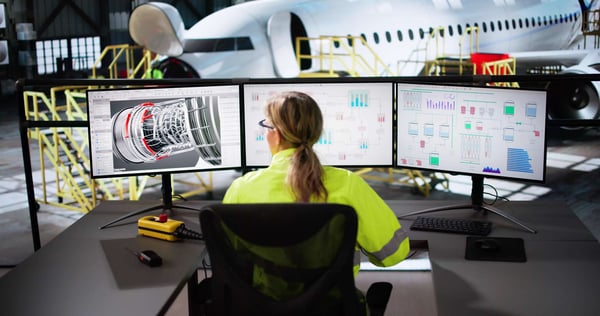With the world becoming increasingly digitized, data and information have become more important than ever. For aviation maintenance, this means collecting live sensor data from engines and other aircraft components to predict necessary maintenance operations ahead of time. Developments in machine learning and big data have proved that predictive maintenance in the aviation industry is possible, but only if the necessary information is accessible.
.webp?width=778&height=407&name=justin-lim-R-4BizknlZ0-unsplash%20(1).webp)
This leads to one of the greatest obstacles for predictive maintenance: data sharing. The aviation industry has a tendency to compartmentalize information with little integration between sub-industries. For predictive maintenance to reach its full potential, the problem of data sharing (or lack thereof) must first be addressed.
The problem of data silos
A data silo is a term used to describe a data system that is insulated from other data systems. While keeping information categorized may lead to easier organization, the costs often outweigh the benefits. Data silos often lead to miscommunication and waste.
For example, an airline’s relationship with OEMs (original equipment manufacturers) and MROs (maintenance, repair, and overhaul) will often lack the necessary communication to perform at peak efficiency. Airlines may also be hesitant to share sensitive information about their staff or equipment for the risk of it falling into the wrong hands.
The importance of data exchange
Seamless data integration between parties in the aviation industry would allow big data and machine learning to prosper. Allowing these recent technological developments to flourish would lead to increased performance at a reduced cost.
In the world of aircraft maintenance, this means unlocking the full potential of predictive maintenance. Anticipating wear and tear of aircraft components would lead to reduced time and money spent in the hangar. Here’s how:
Time-wise, knowing which parts of the aircraft need repair in advance is much more efficient than checking the entire plane for faulty parts. This allows flight mechanics to dive immediately into the repair process, which avoids the lengthy inspection process. This also leads to increased safety, as live sensor data has proved to be more reliable than manual inspection.
Money-wise, an airline wouldn’t need to purchase as many spare parts. Without predictive maintenance, an airline would need to come prepared for virtually every foreseeable problem if it wants to keep its planes in the air year-round. With predictive maintenance, the airline has a window of opportunity to purchase and ship only the necessary parts for repair. By the time the aircraft needs repairing, the spare parts would already be ready for use.
Aviadex.io: A data exchange platform
Data exchange platforms such as Aviadex.io allow for a secure and seamless exchange of information between collaborating parties. For optimal efficiency, Aviadex.io offers automated data transfer to eliminate any delay in communication between parties.
Because parties tend to use separate operating systems to fit their own needs, Aviadex.io also translates data into any ingestible format as needed. This helps circumvent the compatibility issues that are often responsible for suboptimal data exchange.
Finally, Aviadex.io comes with built-in data validation to ensure that no faulty data is shared between parties. The data exchange platform will flag any data quality issues to avoid any mishaps and to guarantee that its clients are only working with the best of information.


 Andy Graham
Andy Graham
 If you are interested in knowing how you can improve your efficiency in maintenance operations, book a 30-minutes discovery call with us.
If you are interested in knowing how you can improve your efficiency in maintenance operations, book a 30-minutes discovery call with us.

